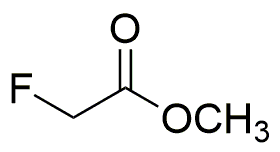Methyl fluoroacetate is widely utilized in research focused on:
- Pharmaceutical Development: This compound serves as an important intermediate in the synthesis of various pharmaceuticals, particularly in creating fluorinated compounds that can enhance drug efficacy and selectivity.
- Agricultural Chemicals: Methyl fluoroacetate is used in the formulation of pesticides and herbicides, providing effective solutions for pest control while minimizing environmental impact compared to traditional chemicals.
- Fluorinated Polymers: It plays a crucial role in the production of fluorinated polymers, which are known for their high thermal stability and chemical resistance, making them ideal for use in coatings and seals in various industries.
- Research in Organic Chemistry: This chemical is a valuable reagent in organic synthesis, facilitating reactions that lead to the formation of complex molecules, thereby aiding researchers in developing new materials and compounds.
- Environmental Studies: Methyl fluoroacetate is also studied for its behavior in the environment, helping researchers understand its degradation pathways and potential impacts on ecosystems, which is essential for regulatory assessments.
General Information
Properties
Safety and Regulations
Applications
Methyl fluoroacetate is widely utilized in research focused on:
- Pharmaceutical Development: This compound serves as an important intermediate in the synthesis of various pharmaceuticals, particularly in creating fluorinated compounds that can enhance drug efficacy and selectivity.
- Agricultural Chemicals: Methyl fluoroacetate is used in the formulation of pesticides and herbicides, providing effective solutions for pest control while minimizing environmental impact compared to traditional chemicals.
- Fluorinated Polymers: It plays a crucial role in the production of fluorinated polymers, which are known for their high thermal stability and chemical resistance, making them ideal for use in coatings and seals in various industries.
- Research in Organic Chemistry: This chemical is a valuable reagent in organic synthesis, facilitating reactions that lead to the formation of complex molecules, thereby aiding researchers in developing new materials and compounds.
- Environmental Studies: Methyl fluoroacetate is also studied for its behavior in the environment, helping researchers understand its degradation pathways and potential impacts on ecosystems, which is essential for regulatory assessments.
Documents
Safety Data Sheets (SDS)
The SDS provides comprehensive safety information on handling, storage, and disposal of the product.
Product Specification (PS)
The PS provides a comprehensive breakdown of the product’s properties, including chemical composition, physical state, purity, and storage requirements. It also details acceptable quality ranges and the product's intended applications.
Certificates of Analysis (COA)
Search for Certificates of Analysis (COA) by entering the products Lot Number. Lot and Batch Numbers can be found on a product’s label following the words ‘Lot’ or ‘Batch’.
*Catalog Number
*Lot Number
Certificates Of Origin (COO)
This COO confirms the country where the product was manufactured, and also details the materials and components used in it and whether it is derived from natural, synthetic, or other specific sources. This certificate may be required for customs, trade, and regulatory compliance.
*Catalog Number
*Lot Number
Safety Data Sheets (SDS)
The SDS provides comprehensive safety information on handling, storage, and disposal of the product.
DownloadProduct Specification (PS)
The PS provides a comprehensive breakdown of the product’s properties, including chemical composition, physical state, purity, and storage requirements. It also details acceptable quality ranges and the product's intended applications.
DownloadCertificates of Analysis (COA)
Search for Certificates of Analysis (COA) by entering the products Lot Number. Lot and Batch Numbers can be found on a product’s label following the words ‘Lot’ or ‘Batch’.
*Catalog Number
*Lot Number
Certificates Of Origin (COO)
This COO confirms the country where the product was manufactured, and also details the materials and components used in it and whether it is derived from natural, synthetic, or other specific sources. This certificate may be required for customs, trade, and regulatory compliance.


